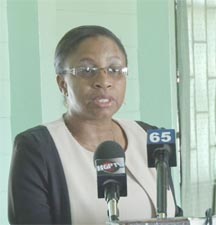Under the theme “Inspiring Change”, the Women and Gender Equality Commission yesterday marked International Women’s Day 2014 with a call for the reform of the justice system to better help women.
The observance, held at the Carifesta Sports Complex, was the organisation’s third successive commemoration of the day and featured a number of speakers, including Justice Roxane George, who spoke extensively on the challenges facing women in acquiring justice.
According to the High Court Judge, there are pervasive threats to the crucial justice issues of concern to women, such as gender-based violence, sexual harassment and discrimination in the workplace.

“Justice is central to the effort to help women become equal partners in decision making and development. Without justice, women are disenfranchised, disempowered and denied their rightful place,” she said.
“With sound legal and justice systems, women can flourish and contribute to the advancement of society as a whole including by helping to improve those very same systems for future generations, daughters and sons alike.”
During her address, Justice George stated that Guyana has a number of laws which provide a good basis for the advancement of women’s human rights. However, she noted that the legislative underpinnings and foundations are debased due to issues with the implementation of the laws.
She associated these issues with a number of factors, including women’s ignorance of their rights, the lack of facilities to provide for more widespread legal aid and the lack of personnel to address the concerns of women. She stated that there is need for support services and mechanisms to assist women attempting to access justice. She added that more should be done to build a database of persons such as psychologists, social workers, trained personnel for rape crisis centres and forensic interviewers to interview victims of rape.
Most importantly, she said, the training of women in the law enforcement agencies, particularly within the Guyana Police Force (GPF), should be intensified. “These women should be trained not only in policing but in gender-sensitive policing,” she emphasised.
Justice George cited a United Nations report, which points to a positive correlation between the presence of female police officers and the reporting of sexual assault.
Justice George also suggested the establishment of “one-stop” places which provide a number of services including counselling and medical examinations to lessen the need to repeat the circumstances of the incident.
These establishments, she said, will improve the level of confidence women have in the administration of justice, encourage them to engage the justice system as well as reduce the number of women who abandon the justice system because of drawn-out procedures.
She also mentioned the need for apartment blocks for persons seeking refuge from violence. Though many women walk out of violent relationships, Justice George pointed out that they often face “tremendous difficulty” in accessing other living accommodations. In the absence of such governmental housing, women will be at a disadvantage in enforcing their right to be free from violence, she said.
However, she did not lay all of the responsibility with the justice system. She emphasised that women needed to learn their own responsibilities, including respecting themselves and responsibly accessing the justice system.
She also appealed to the media to act responsibly. “The media, especially our national media entities, must not portray women as objects of disrespect whether it is in the music that is played, the photographs that are portrayed or the comments and programmes that are aired,” she stressed.
In solidarity with the commission, Prime Minister Samuel Hinds made an appearance at the conference and spoke briefly on the need to end the brutalisation of Guyana’s women by its men.
International Women’s Day began observances around the world since the early 1900s.




